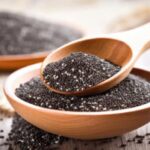Calcium accounts for approximately 99% of the total mineral content in bones. This mineral is essential for maintaining strong and healthy bones and teeth. Additionally, calcium plays other crucial roles in the body, such as supporting muscle and nerve function and contributing to blood clotting.
As we age, our body’s calcium levels naturally decline. Several other factors can also impact the absorption of calcium in the body.
Certain foods can deplete calcium levels in the body, leading to weakened bones over time. It is important to be mindful of these dietary choices and make adjustments to promote optimal calcium absorption and bone health.
High-Sodium Foods
Consuming excessive amounts of sodium can increase the excretion of calcium through urine. The more sodium we eat, the more calcium our kidneys excrete. This leads to a decrease in calcium levels in the blood. To compensate, the body starts pulling calcium from the bones, resulting in reduced bone density. This process poses a more significant threat to postmenopausal women and the elderly.
Examples of high-sodium foods to limit include fast food, canned goods, processed foods, and pickled vegetables. A long-term habit of eating salty foods increases the risk of osteoporosis and bone fractures.
Foods High in Saturated Fat
Saturated fat can hinder calcium absorption in the intestines. Fat from greasy foods can combine with calcium to form insoluble compounds, making it challenging for the body to absorb calcium effectively.
A diet high in saturated fat also contributes to rapid weight gain, placing additional strain on the skeletal system. Common food items rich in saturated fat include fried foods, fast food, sugary baked goods, and animal organ meats.
Consuming excessive amounts of saturated fat increases the risk of cardiovascular disease.

Carbonated Soft Drinks
While soft drinks may provide a pleasant sensory experience, they offer little to no nutritional value and can be detrimental to our health. Carbonated soft drinks often contain high levels of phosphoric acid, which increases the excretion of calcium through urine.
Additionally, the excessive amounts of sugar in these beverages can interfere with calcium absorption and disrupt the body’s calcium metabolism.
Consuming large quantities of soft drinks can lead to reduced bone density and an increased risk of osteoporosis. To protect your bone health, it is advisable to minimize soft drink consumption and opt for healthier alternatives such as water, herbal teas, and natural fruit juices.
Coffee
Coffee, known for its caffeine content, provides a boost of energy and alertness to many drinkers. However, the downside of caffeine is its diuretic effect, which increases the excretion of calcium through urine. Consuming more than three cups of coffee per day can result in a significant loss of calcium from the body, potentially impacting bone health if not adequately compensated through diet.
Additionally, caffeine can inhibit calcium absorption in the intestines. While there is no need to abstain from coffee entirely, moderation is key.
Alcohol
Excessive alcohol consumption is known to take a toll on liver health, but it also weakens the skeletal system. Alcohol impairs calcium absorption in the intestines and interferes with the body’s ability to metabolize vitamin D, which is crucial for calcium absorption and utilization.
Alcohol can also disrupt the function of osteoblasts, the cells responsible for bone formation, thereby hindering the bone-building process. For women, long-term alcohol consumption can lead to hormonal imbalances, affecting the regulation of bone-forming hormones.
In conclusion, these five types of foods and beverages can negatively impact bone health and increase the risk of osteoporosis. By being mindful of our dietary choices and making adjustments, we can effectively protect our bone health and overall well-being.
“Unveiling the Surprising Calcium-Rich Fruits and Vegetables”
“For those who prefer a plant-based diet or are simply looking to reduce their meat and fish intake, there’s good news: you can still get your fill of calcium. A variety of fruits and vegetables are rich in this essential mineral, offering a delicious and nutritious way to support your health. Discover the plant-based sources of calcium that can easily be incorporated into your daily meals.”





































